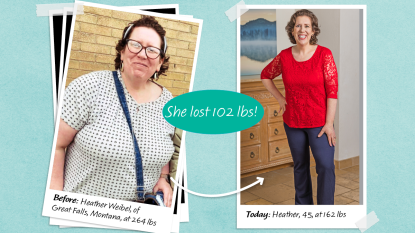This 3 Week Detox Can Help You Lose Weight Without Feeling Hungry

Anyone who’s ever tried to lose weight knows how frustrating it is to finish a delicious meal and feel hungry an hour later. How is that even possible after you’ve consumed plenty of calories? Noel Maclaren, MD, a pioneer in metabolic research and a professor at the Weill Cornell Medical College, says there’s actually a very simple explanation for why you feel famished all the time. And best of all: It’s not your fault and this three week detox can make you feel fuller longer!
The problem: Modern processed foods are designed to trigger hunger. “Sugar and grains — which make up around 70 percent of the calories we eat these days — have potent appetite-revving effects,” Dr. Maclaren explains. Because sugar and grains are so easy to digest, they’re broken down quickly and flood the small intestine all at once.
“There, they stimulate the production of ghrelin, a hormone that signals the brain that the body is hungry — which means these foods make you feel hungrier even as you eat!” Making matters worse: This process also shuts down the production of leptin, the “I’m full” hormone. “The combined effect not only drives us to eat more,” says Dr. Maclaren, “it also drives cravings for more sugar and grains.”
And these misfiring hunger hormones prevent fat burning. When ghrelin levels are high and leptin levels are low, the brain is barraged by messages that the body is hungry. “This prompts the body to store fat so we can survive a period of famine,” explains endocrinologist Robert Lustig, MD, author of Metabolical (Buy on Amazon, $18.99).
When leptin levels get too low, the brain signals that it needs to conserve energy and store fat. That may explain why, in a study from Spain, adults with low leptin levels burned fat seven times more slowly than those with optimal leptin levels.
Conversely, high levels of ghrelin tell the body to keep fat locked in cells, so it can’t be burned for fuel, Swedish researchers report. The result? Pounds that just won’t be burned.
The good news: It’s easy to reset your hunger-control system to eliminate hunger and speed fat burn. The key: Replace simple carbs like sugar and grains with fiber-rich complex carbohydrates for just three weeks, says Dr. Maclaren. “Complex carbs travel more slowly through the digestive tract, so they make it to the lower intestine, where they stimulate appetite-appeasing hormones over a longer period of time.” This steady stream of “I’m full” hormones means you’ll naturally feel more satisfied and eat less, Dr. Maclaren promises.
“As a result, you don’t have to count calories,” observes the doctor. In fact, research shows that removing sugars and grains from your diet means you’ll eat 440 fewer calories a day without any other diet changes. After three weeks, the body will be better able to respond to ghrelin and leptin signals, so you’ll keep slimming even as sugar and wheat go back on the menu.
Experts say the strategy can be as effective as gastric bypass. In a University of Washington study, adults who underwent bariatric surgery had 57 percent less ghrelin than their naturally lean counterparts. Dr. Maclaren says ditching sugar and grains yields the same effect, and that many women report that hunger and cravings disappear within five days on his plan.
Dropping stubborn pounds is just the beginning: Women FIRST spoke to experienced improved mood, sleep and energy, reversed prediabetes and eased symptoms of chronic ailments like multiple sclerosis. “I’m thrilled I was able to lose over 150 pounds — and get off and stay off my blood-pressure and cholesterol medications,” cheers Donna Rubin, 63. “I look in the mirror and smile now!”
Ready to start your transformation? Read on for the strategies that will help you slim without deprivation.
The Three Week Slimming Plan
Unlike some popular diets that have you counting calories and tracking macronutrients every time you eat, the food formula developed by award-winning metabolic researcher Noel Maclaren, MD, author of Maximize Your Metabolism (Buy on Amazon, $21.49), requires no complicated diet math: Simply cut out sugar and fast-digesting carbohydrates like bread, quick-cooking oatmeal and even “health foods” like quinoa, barley and brown rice for three weeks to reset your appetite control system and supercharge slimming. “We know that these food groups hijack hunger hormones and prevent the body from getting the signals that tell you when you’re full,” says Dr. Maclaren. “And while you can’t just switch these signals ‘on’ or ‘off’ easily, you can optimize how they work by steering clear of sugar, grains and processed foods and eating plenty of protein, healthy fats and low-starch veggies.”
For the next three weeks, you’ll construct your meals with vegetables (with the exception of squash, potatoes, and beets), nuts, seeds, beans, legumes, tofu, poultry, fish, shellfish, no-sugar-added nut butters, eggs, cheese, Greek yogurt, spelt, buckwheat, steel-cut oats, millet, olive oil, ghee, and butter. And to effortlessly drop pounds and blast body fat —without feeling hungry all the time — incorporate these simple tips into your daily routine.
Get your fill of protein and fat. There is no calorie counting or assigned amount of nutrients to consume at each meal on Dr. Maclaren’s plan, but loading your plate with protein and fat goes a long way toward triggering healthy hunger hormone production, so you’ll feel satisfied, he assures. In fact, research published in The American Journal of Clinical Nutrition found that protein-rich meals decrease the production of the hunger hormone ghrelin — and that’s especially true in the morning. In another study, a high-protein breakfast raised subjects’ levels of appetite-suppressing hormones by 298 percent.
Graze all day. “Eating smaller meals more frequently tends to work better as you’re resetting ghrelin than having fewer, bigger meals,” explains Dr. Maclaren. “That’s because the bigger your meal, the more ghrelin gets stimulated, and that tells the brain to eat.” To experience the benefits, aim to eat four or five small meals throughout the day, rather than two or three large meals.
Pick these natural sweets. While fruit is rich in a number of beneficial nutrients, many types are also high in fructose, a type of natural sugar that can slow your progress as you reset your appetite-control system, explains Dr. Maclaren. For that reason, he recommends reaching for lower-fructose options, including apricots, berries, Granny Smith apples and green pears. High-fructose fruits to sidestep for three weeks include red apples, bananas, cherries, coconut, dates, grapes, kiwi, mango, melon, oranges, papaya, and pineapple. After the reset, you can gradually add them back into your diet in moderation.
Get plenty of sleep. Sleep helps regulate hormones — including the ones that control appetite, says Dr. Maclaren. In fact, according to a study conducted at the University of Chicago, dieters lost 230 percent more fat during weeks that they got ample sleep compared to weeks when they were sleep-deprived. That’s because inadequate sleep boosts ghrelin and depletes leptin (the “I’m full” hormone), while sufficient sleep keeps your metabolism running optimally, explains Dr. Lustig. “Think of sleep like garbage pickup day at your house,” he explains.
“When the garbage collector comes, things are good. But if he didn’t show up for few weeks, all that garbage would build up to the point where your house would be unlivable.”
Move a little. Aim to do some type of cardiovascular workout at least three times each week, Dr. Maclaren advises. “The ultimate goal is to move for 45 to 60 minutes at a time,” he says. “This duration makes a dramatic change because it enables your muscles to use glucose in the blood more effectively,” which in turn helps reset hunger hormones and keeps your metabolism humming. For best results, opt for low-intensity activities, such as walking, swimming, or stretching.
According to researchers at Drexel University in Philadelphia, the slow, gentle rise in body temperature created by these low-impact exercises curbs the production of ghrelin — an effect that made study subjects 50 percent less likely to overeat for three hours after exercise.
A version of this article originally appeared in our print magazine, First for Women.













